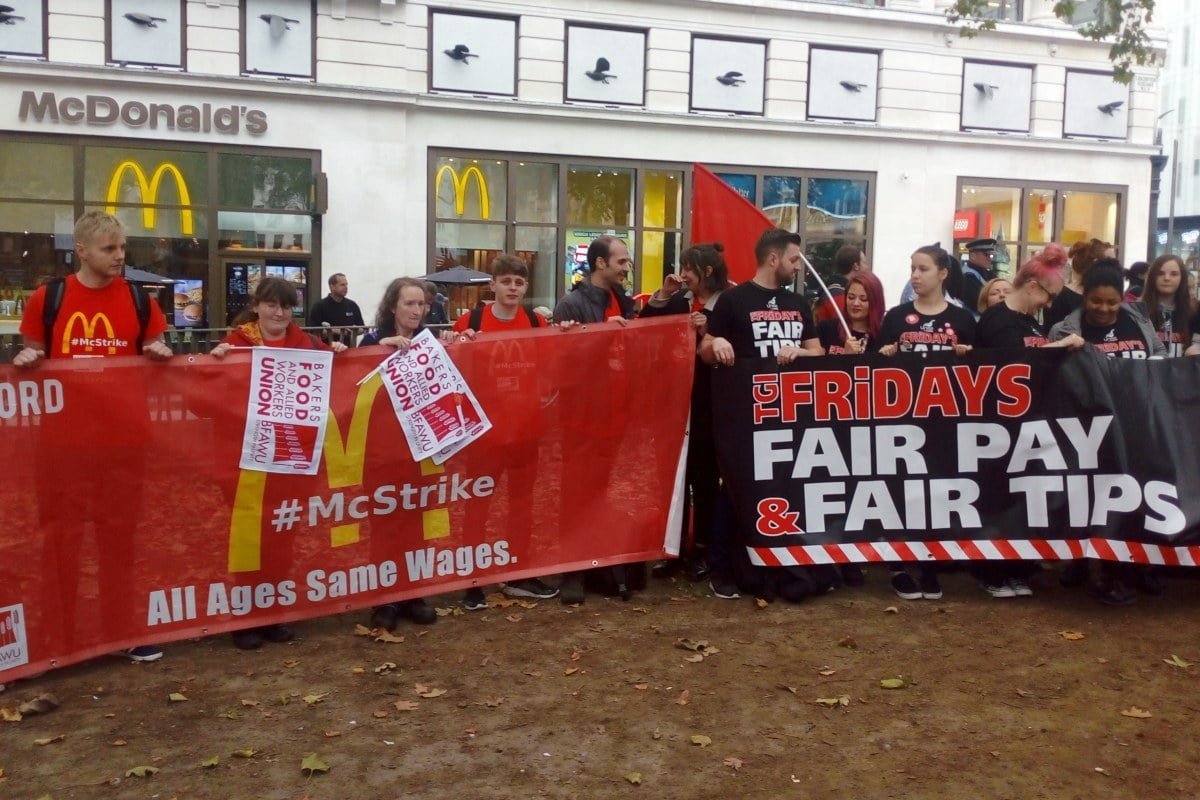The co-ordinated strike action by workers at three major restaurant chains last week shows how to go about organising those in precarious industries.
On Thursday 4th October an historic strike of hospitality workers took place. Workers in several McDonald’s, JD Wetherspoon, and TGI Fridays restaurants took strike action which (in the case of the Wetherspoon workers) represented the first time the company had been hit by collective action of this kind.
Militant words and action
The strikers’ demands are for union recognition; an end to zero-hours contracts; an end to ‘youth rates’ for younger workers; and for a £10 per hour minimum wage. At the McDonald’s picket line in Brixton, South London, and at the strike rally in Leicester Square later the same day, the workers’ slogan was the same: If we don’t get it, shut it down.
These militant words were matched by militant action. In Leicester Square, after speeches from trade union leaders and John McDonnell, the shadow chancellor, the rally turned into a spontaneous picket line in front of the Leicester Square branch of McDonald’s.
And at the rally outside Wetherspoon in Brighton, Socialist Appeal activist Nat Arkwright reported that:
“After the rally the crowd split in two and walked to picket lines with more or less continuous chanting and brief agitational speeches by the workers. One worker’s account of management’s attempt make workers feel isolated and powerless met with a strong reaction from crowd. The head office suits inside the pub quickly vacated the premises after that.”
Organising the ‘unorganisable’
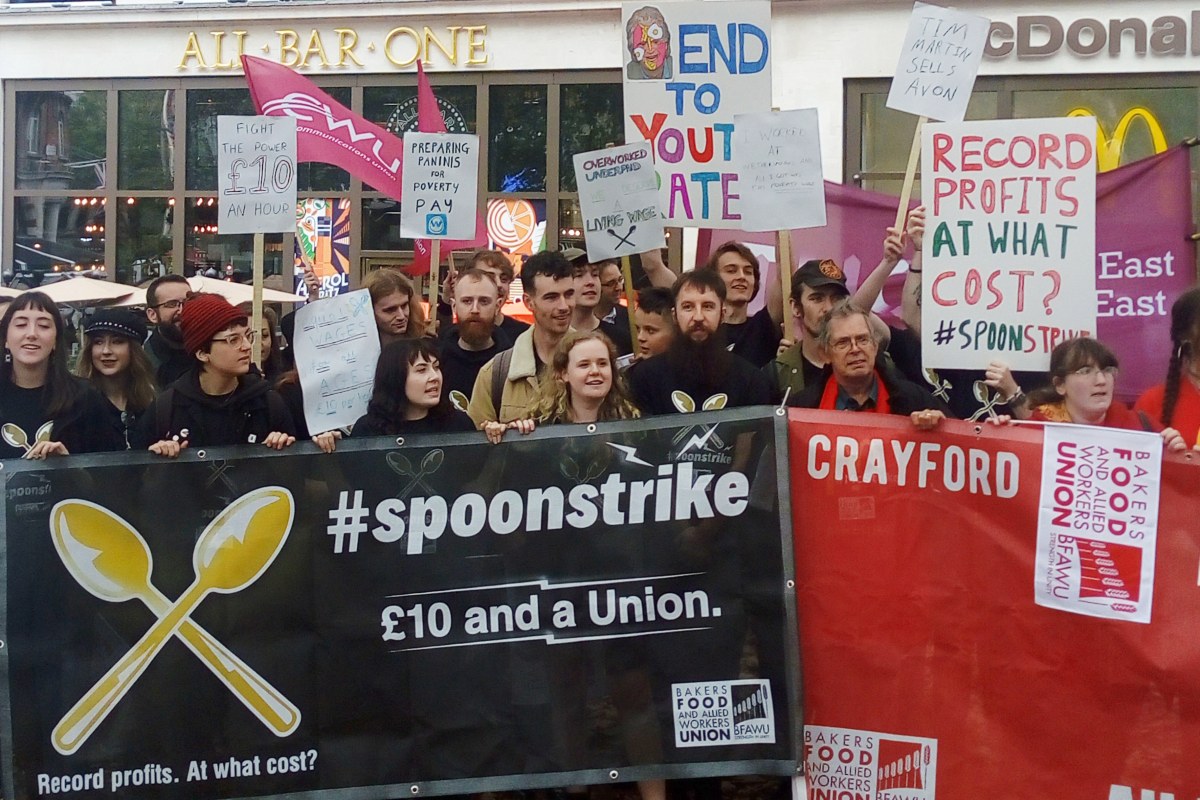 The significance of this strike action shouldn’t be underestimated. At the Leicester Square rally of striking workers Daniel Morley from Socialist Appeal said:
The significance of this strike action shouldn’t be underestimated. At the Leicester Square rally of striking workers Daniel Morley from Socialist Appeal said:
“I think this represents an historic development in the labour movement. I’m sure many of the workers striking are from middle class backgrounds and have got degrees. But the crisis of capitalism has proletarianised them. They’re stuck in these low paid jobs, and housing is cripplingly expensive. They’ve got no choice but to unionise and strike. They said the service sector was not ‘unioniseable’. But I think we’re at the beginning of a wave of unionisation and militancy.”
And in a similar vein, Ian Hodson, president of BFAWU, the bakers’ and food workers union, stated that:
“The unorganised tag that’s been put on these workers – that says you cannot organise workers in this industry – is a lie. These workers are proof of that lie. [Wetherspoon workers are part of] a new movement; a new labour movement; a new history of trade unionism in this country”
The organising of apparently ‘unorganisable’ workers was a common theme for those on strike and those who came out in solidarity with them.
On the McDonald’s picket line in Brixton, Beatrice from the UCL Marxist society interviewed Bettie, a McDonald’s worker from St. Louis, Missouri, who has been involved in the struggle for a minimum wage in the United States and who had flown in to support the ongoing movement here in the UK.
Bettie was incredibly enthusiastic and hopeful about the McStrike and its future, saying that:
“In the States they told us, ‘you’re never gonna get $15/hr, you’re never gonna get people to unionise’. But we fought for six years and we got $15/hr in Washington, California and New York. We won $15/hr in St. Louis as well, but then they passed legislation to repeal it, but do you think that’s going to stop us? That’s only going to make us fight harder, because I know I deserve this. I deserve to be able to pay my bills and be comfortable, just like everybody else does. And we have to organise and fight for that!”
John McDonnell gave an interview to Socialist Appeal at the London strike rally in which he explained that strengthening the trade union movement is the best way to defend precarious workers against intimidation by employers.
The work by the BFAWU union in organising the Wetherspoon and McDonald’s workers, and by Unite the Union with the TGI Fridays workers, meanwhile, proves that organising workers into a bold campaign that is willing to take militant action is the best way to strengthen the trade union movement.
The power of the organised working class was explained by the striking workers themselves. Chris Heppel, who works in the Post & Telegraph Wetherspoon pub in Brighton, said at the strike rally that:
“Last year I joined the bakers’ union and with others started to organise in my pub, because I was sick of struggling to get by. I was sick of feeling like nothing would ever change and I was sick of feeling like I was voiceless and powerless. And now, standing here in front of everyone, I don’t feel like that anymore. Instead I feel more powerful than I’ve ever felt, because I don’t stand alone anymore.
“For years we’ve been underpaid; for years we’ve been ignored; and for years these jobs have forced us all into poverty. They’ve drained us emotionally and physically…This is about jobs that exploit us, and more than that deprive us of our dignity. And we know that we’re not the only ones. That is why we came together with the McDonald’s workers, the TGI workers, the UberEats drivers – we don’t just fight for ourselves, we fight for everyone.”
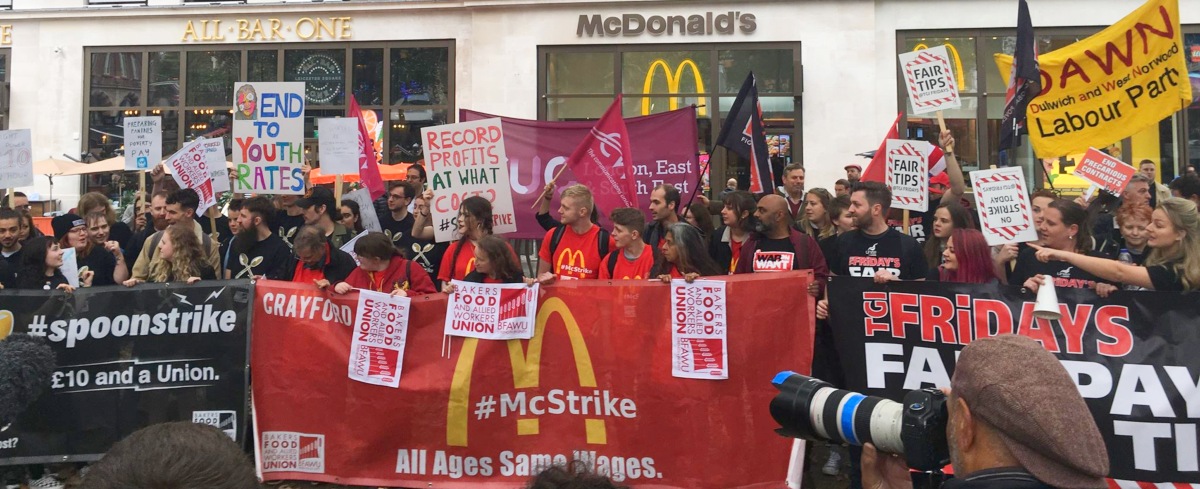
The industrial and the political struggles
In his speech to the Leicester Square rally, John McDonnell explained that the day before this strike action a memo had been sent out by Labour HQ to all Labour MPs saying that if there was a picket line in their constituencies it was their responsibility to join it. This shows just how far the Labour Party has come under the leadership of Corbyn and McDonnell.
Likewise, Lloyd Russell-Moyle, the Labour MP for Brighton Kemptown, said at the Brighton rally that, “The only point of a Labour Member of Parliament is to be the representative of the organised working class in parliament.”
The Labour Party has the authority and ability to give a massive impetus to the trade union movement in Britain, especially among the unorganised layers of the working class.
To do so it needs to offer a bold socialist programme and build a movement alongside the trade unions to bring down the Tory government – through strikes, demonstrations, and other industrial action – and bring a socialist Corbyn-led Labour government to power. This would be all the inspiration many workers would need to join a union and push for radical industrial action.
Encouragingly, when one Socialist Appeal supporter spoke to Bambos Charalambous, the Labour MP for Enfield Southgate at the Leicester Square rally, about the need to reinstate Clause 4 into the Labour Party constitution, Bambos expressed his agreement with this idea.
Measures like this – which would restore the fight for socialised ownership of the economy to the heart of the Labour Party – are exactly how Labour will build a mass movement for a fundamental transformation of society.
Solidarity
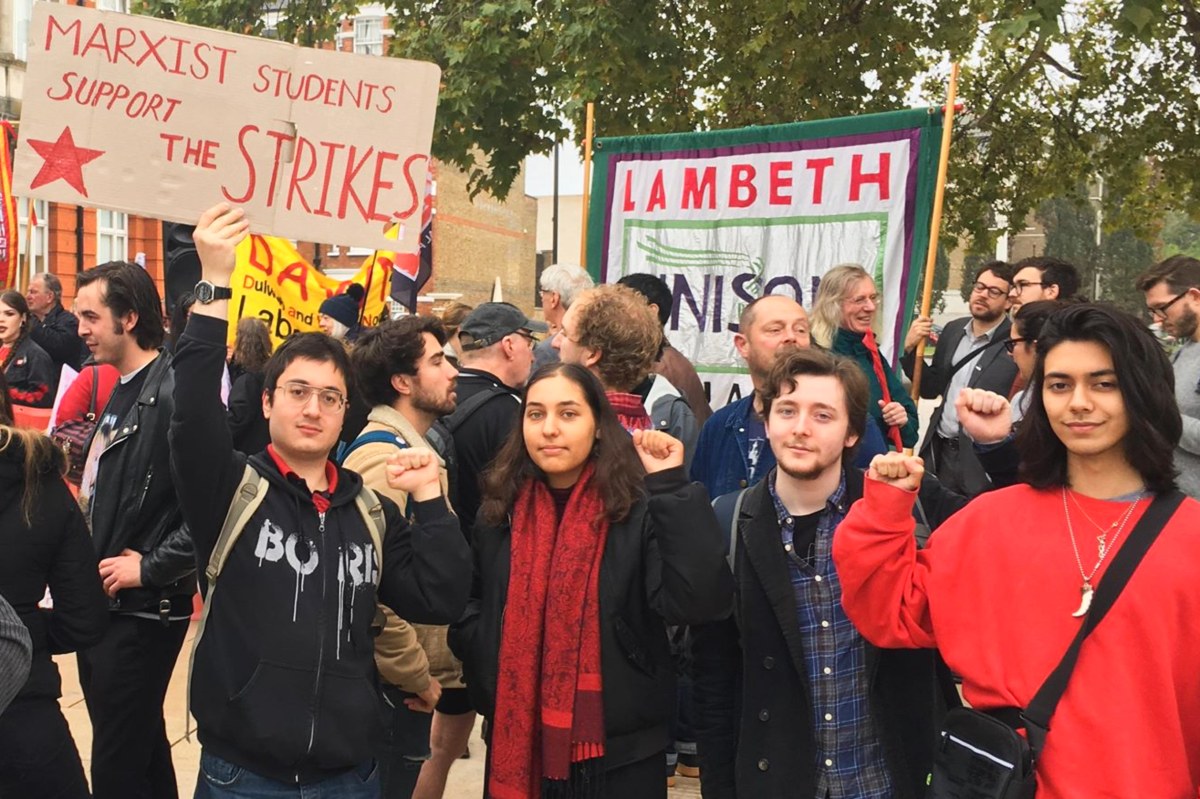 Thursday 4th October was an international day of strike action against the multinationals like McDonald’s that dominate the hospitality industry.
Thursday 4th October was an international day of strike action against the multinationals like McDonald’s that dominate the hospitality industry.
The Leicester Square rally was addressed by McStrikers from France. And Ian Hodson from the bakers’ union explained that:
“Today [the striking workers] met workers from France, from Belgium, from Germany, from Italy, from Argentina, from Barbados, from America…We realise our strength now, and we realise we are not just here in the UK. We are global, we are a movement, we deserve respect.”
International solidarity had a powerful inspirational effect on the strike and the rallies.
Likewise, there was enormous solidarity between students and workers on the picket lines. Around a dozen students from the Marxist societies in UCL, SOAS, Goldsmiths, and Brighton participated in the rallies and pickets.
Nick from the UCL Marxists was at the Leicester Square rally and said:
“The mood of the strikes was very enthusiastic and radical, particularly thanks to the solidarity expressed on an international level. There was attendance from strike groups around the world, particularly from Germany, Sweden, France and the USA. It really gave us a glimpse of the workers’ power and the potential of a industrial action nationally and internationally. In this context we heard shouts at the rally of ‘power to the workers’ and about making the bankers and corporations tremble.
“Of course, this strike still needs to pick up a lot of steam to be successful, either for the immediate demands, or further to bring down the bosses and overthrow the system. But linking these different movements together can rapidly enthuse and give courage to workers in such sectors as McDonalds, who are currently too intimidated to take strike action.”
Ciaran, a masters student at Sussex University told Socialist Appeal at the rally:
“I’m here to show my support for the striking hospitality workers in their struggle for decent working conditions and fair pay. It isn’t right that the bosses and shareholders make huge profits while those who do the work often struggle to make ends meet.”
Bekah, a first year from Sussex likewise said:
“Having experienced the unfair, ageist wages of the service industry myself over the past few years, it was inspiring to see the Wetherspoon strikers assert that enough is enough. Their brave show of solidarity let those with power know that times are changing and exploitation will no longer be tolerated.”
And Rania, another first year from Sussex told Socialist Appeal:
“I have just arrived in Brighton as an undergraduate student and I find it very important to show solidarity and support to the community in which you live in. To me, a functional community is one that can, when needed, unite themselves for a cause they believe in, and this Wetherspoon rally has proven that Brighton can unite to fight for the improvement of a decent living wage.”
For students – many of whom work part time in poorly paid jobs and in difficult working conditions while they are studying, and increasingly now after they graduate as well – strike action by these workers is an enormous inspiration. Building solidarity between students and workers will be an essential part of developing this struggle further.
Next steps
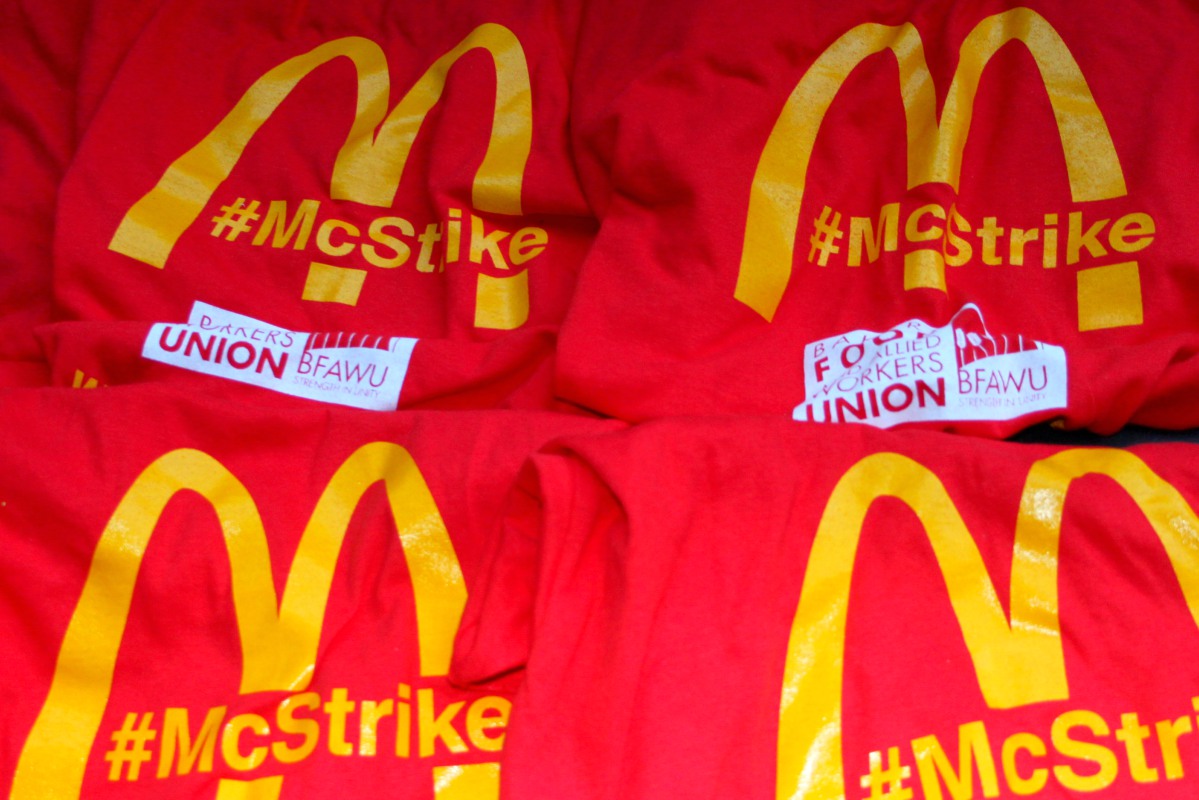 This strike action was historic. But it is just one of the first steps on the road to organising precarious workers so that they can take militant industrial action. We must support the BFAWU and Unite in their efforts to unionise these workers. And we must encourage them to take militant strike action in defence of their rights at work.
This strike action was historic. But it is just one of the first steps on the road to organising precarious workers so that they can take militant industrial action. We must support the BFAWU and Unite in their efforts to unionise these workers. And we must encourage them to take militant strike action in defence of their rights at work.
Above all, we must guarantee the successes of militant industrial action for the long term and for future generations by fundamentally transforming society. This means taking economic and political power out of the hands of the rich, and putting it in the hands of working class people. Only in this way can we use that power to satisfy everyone’s needs instead of a tiny handful of people’s desire for profit.
This means linking a radical trade union movement with a radical Labour Party and bringing down the Tory government in favour of a socialist, Corbyn-led Labour government. It won’t be easy – but if anything proves that we can do it, it’s the determination and resolve that was on display by the hospitality workers on strike last Thursday.

